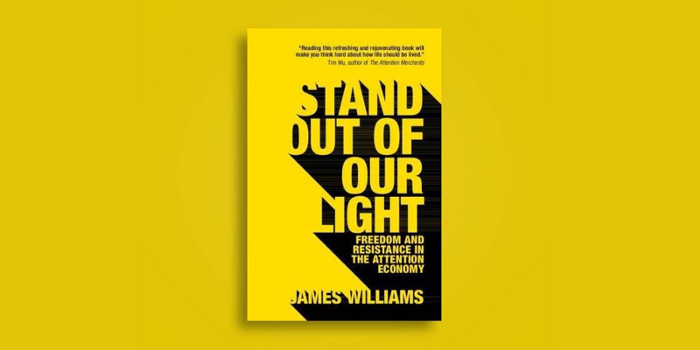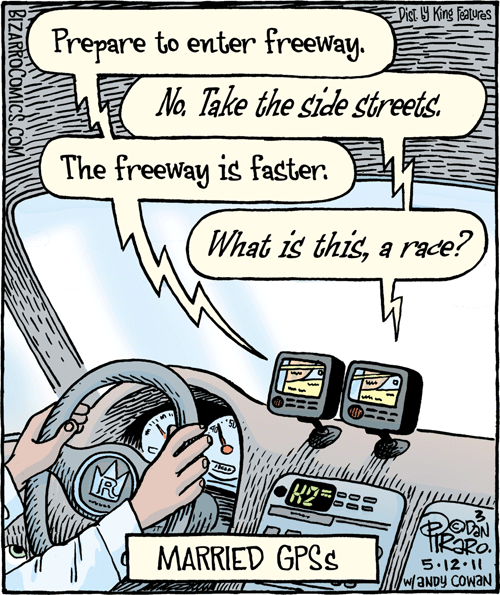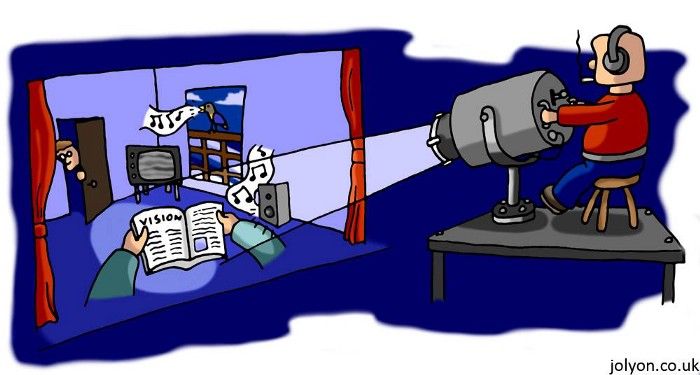The Freedom of Attention
While the defining paradigm shift in technology over the past few years has been that of privacy rights, the next ethical movement will be for our freedom of attention.

While the defining paradigm shift in technology over the past few years has been that of data privacy rights, the next ethical movement will be over our freedom of attention.
In other words, we've fought for transparency and regulation around how companies handle our information, but not around how they manage our attention.
This is the core argument made by ethicist James Williams in his book, "Stand Out of Our Light" (available for free). Williams was a tech-insider before joining the Oxford Internet Institute, spending over a decade at Google and being awarded with the Founder's Award (the company's highest honors).
This is by far the most impactful and profound book I've ever read on the modern attention crisis. Williams observes that there is a deep misalignment between the goals we have for ourselves and the goals our technologies have for us. He also recognizes that we need a new framework for talking about attention to fully understand the implications of the deep sense of distraction we all feel.
GPS for our lives
What is technology supposed to be doing for us?
This is the question Williams wants us to ask ourselves. Despite there being more technology in our lives, it strangely feels harder than ever to stay focused and take action towards our goals.
"I felt . . . distracted. But it was more than just “distraction” – this was some new mode of deep distraction I didn’t have words for. Something was shifting on a level deeper than mere annoyance, and its disruptive effects felt far more perilous than the usual surface-level static we expect from day-to-day life."
Part of the problem is that we don't have the language to describe this deep distraction that we all feel. But where does it come from?
Think about the goals we have for ourselves - reading a book, planning a trip, learning to play an instrument. These are real, human goals. Williams argues that if technology is for anything, it’s for helping us pursue these kinds of goals.
But our information and communication technologies have a very different definition of success - engagement. The default business model for these services is advertising, which is reflected in the goals and metrics used.
"These include things like maximizing the amount of time you spend with their product, keeping you clicking or tapping or scrolling as much as possible, or showing you as many pages or ads as they can."
These goals have no intrinsic value to us. Nobody actively tries to see more ads or spend more time on social media, it would be crazy. And yet, we all catch ourselves engaging far more than we'd like to.
Williams observes that there is a deep misalignment between the goals we have for ourselves and the goals our technologies have for us. This is highly problematic, but most people seem to treat information and communication technologies as fundamentally different from other types of technology in their lives.
Consider the GPS (global positioning system), the technology we rely on to navigate us between physical locations. Williams suggests that we can think of our information and communication technologies as the GPSes for our lives. With every year, we put more and more blind trust in them as companion systems meant to help us realize our goals and values.
When using the GPS in your car, we have come to expect it to bring us to our destination every time. There is very little margin for error. It would be outrageous if it consistently led you down the wrong roads and dropped you off at some undesired location. In the words of Williams,
"No one would put up with this sort of distraction from a technology that directs them through physical space. Yet we do precisely this, on a daily basis, when it comes to the technologies that direct us through informational space. We have a high tolerance for poor navigability when it comes to the GPSes for our lives – the information and communication systems that now direct so much of our thought and action"
The destinations entered into the GPSes guiding the lives of millions of human beings are the engagement metrics that serve the interests of digital advertising - number of views, time on site, number of clicks, and so on. It's comes as no surprise that we are constantly distracted by our technologies - these metrics all involve capturing the user's attention and redirecting it towards something else.
Zooming out, there is a fierce global competition between digital products and services all vying for our attention, each with its own agenda and goals for you. As a result, the different GPSes that you trust are telling you different things, none of which are actually helping you get to where you want to be in life.

To grapple with this wider set of deep technological distractions, Williams believes that what we need is a richer and more expansive way of describing our attention.
A wider view of attention
What is attention? Everyone has some sense for what attention is, but most would have a hard time putting it into words.
It's commonly described as a spotlight that we can direct towards things we want to attend to, the subject of our moment-to-moment awareness. You can imagine a little person sitting in your head, swiveling the spotlight of your attention.

It's important to note that we effectively have two attentional systems. We have the ability to internally direct our attention towards things that matter, but our attention is also subject to involuntary distraction from our environment (e.g. push notifications from our phones). In other words, the person in your head sometimes loses control of the spotlight when something surprising enters your awareness.
Our everyday language with respect to attention only encompasses these surface-level distractions. We need a deeper understanding of attention to fully appreciate the implications of the attention crisis. To get at this, Williams reframes the question from "What is attention?" to "What do you pay when you pay attention?"
You pay with everything else you could have paid attention to, but didn't. You pay with all the goals you didn't realize, all the decisions you didn't make, all the versions of you that you could have been.
You pay for those extra few Friends episodes with the sleep you didn't get and the fresh feeling you didn't have the next morning. You pay for that extra hour you spent compulsively reading about the coronavirus with the heart-to-heart talk you could have had with an anxious friend.
"We pay attention with the lives we might have lived. When we consider the opportunity costs in this wider view, the question of attention extends far beyond the next turn in your life’s GPS: it encompasses all the turns and their relations, the nature of your destination, the specific way you want to get there, why you’re going there, and also your ability to ask any of these questions in the first place."
In other words, Williams suggests that we should think of attention as the full stack of navigational capacities across all levels of human life, not just the next turn. In addition to the spotlight of attention, it might be useful to think about two additional "lights" of attention.
The “Spotlight” (doing). Our immediate capacities for navigating awareness and action toward tasks. Enables us to do what we want to do.
The “Starlight” (being). Our broader capacities for navigating life “by the stars” of our higher goals and values. Enables us to be who we want to be.
The “Daylight” (knowing). Our fundamental capacities – such as reflection, metacognition, reason, and intelligence – that enable us to define our goals and values to begin with. Enables us to “want what we want to want.”
We currently only talk about distractions with respect to the spotlight of attention, which is limited to what we are doing. What are the consequences of deeper layers of distraction related to the starlight (being) and daylight (knowing) of our attention?
When the starlight of our attention is compromised, we begin to diverge from the identity and values by which we want to live, resulting in an existential sort of distraction. Our information technologies guide us towards a low-level, short-term goals as though they are higher, intrinsically valuable ones. A simple example is the degree to which we chase likes and followers on social media rather than pursuing more meaningful conversations and connections on these platforms.
When the daylight of our attention is undermined, we begin to lose the capacity to know and define what our goals and values are - an epistemic sort of distraction. More specifically, epistemic distraction is the diminishment of underlying capacities such as reflection, memory, prediction, leisure, reasoning. These cognitive processes are critical for "big-picture" thought needed for truly long-term goals. For instance, many of us have a habit of compulsively checking our phone whenever we have a spare moment - snippets of time when we would otherwise be reflecting on their goals, considering our motives, and questioning our beliefs.
With this expanded notion of attention, it's clear that the problems of distraction should not be minimized as minor annoyances. Ultimately, the competition for our attention "threatens to frustrate one's authorship of one's own life".
Technology that's on our side
We started by asking what is technology supposed to be doing for us. If we agree that technology is meant to help us pursue our goals and values, then the challenge is to change the system so that the goals and values of our technologies are aligned with our own.
This means fostering an environment of incentives fundamentally different from the current digital advertising model. We need more transparency around what our technologies are designed to do for us (and more clarity around what we want from our technologies).
Williams outlines four impactful interventions to help move us in this direction:
- rethinking the nature and purpose of advertising
- conceptual and linguistic reengineering
- changing the upstream determinants of design
- advancing mechanisms for accountability, transparency, and measurement.
Unfortunately, I won't be expanding on these in this article. If you want to explore these ideas, I urge you to actually read Stand Out of Our Light - there's so much more content that I didn't cover here.
In closing, Williams leaves us with this final message:
In order to do anything that matters, we must first be able to give attention to the things that matter. It’s my firm conviction, now more than ever, that the degree to which we are able and willing to struggle for ownership of our attention is the degree to which we are free.
If you enjoyed this article, you'll enjoy reading Stand Out of Our Light even more (did I mention it's free?). To learn more or support these ideas directly, check out the work done by the Center for Humane Technology.
On a related note, be sure to check out my articles on dopamine fasting the right way and on living a more intentional, distraction-free life by transforming your relationship with technology.
Friday Brainstorm Newsletter
For more, join 300+ curious people subscribed to the Friday Brainstorm newsletter. It’s one email a month with the most interesting ideas I've found related to science and health.